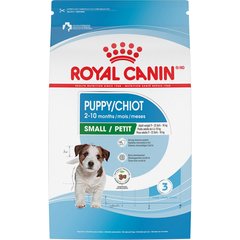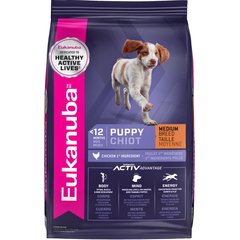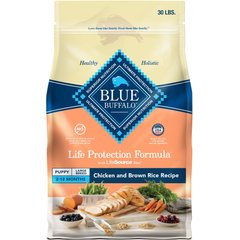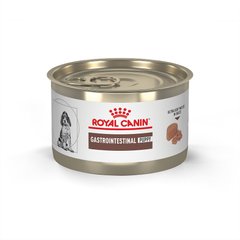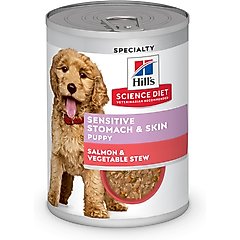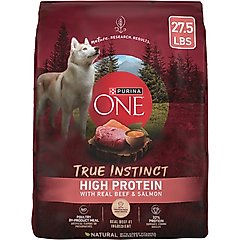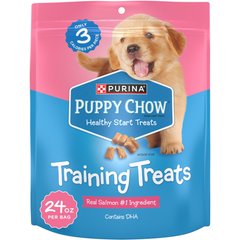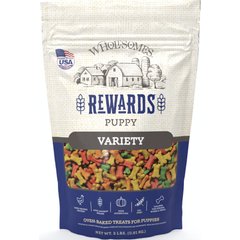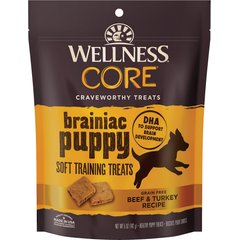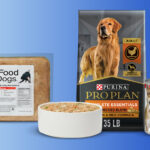How Long Do Puppies Eat Puppy Food?
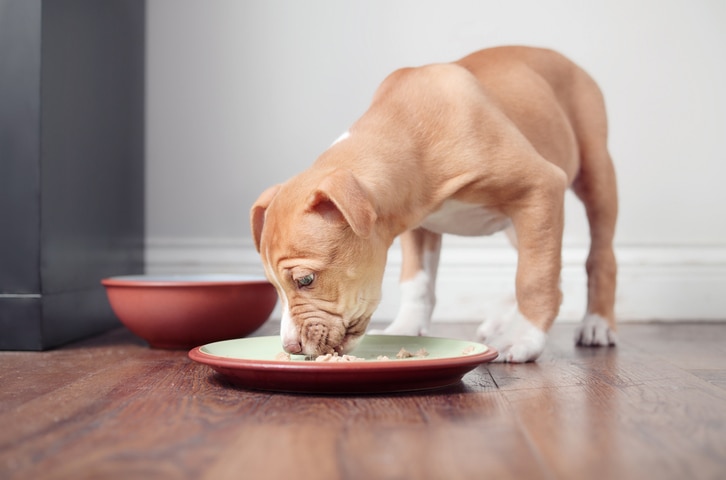
Photo by Petra Richli/iStock/Getty Images Plus
One of the best ways to give your dog a long life is to make sure their food matches their life stage.
For puppies, that means food that supports their growing bones and gives them energy for all those games of fetch and tug-of-war.
But how long do puppies eat puppy food?
Always consult your veterinarian before making any changes in your dog’s diet.
Key Takeaways
- Puppies need to stay on a puppy diet until they reach adulthood, but that age varies for every pup.
- Smaller dogs reach adulthood sooner than larger breeds.
- Puppies have different nutritional needs than adults.
- They need higher calories, more protein, and omegas to support healthy growth.
Why Do Puppies Need Special Food?
Since they’re still growing, puppies generally require more calories and higher levels of protein than adult dogs.
However, breed, size, health, and exact age could affect this.
Excessive calories and protein can actually be detrimental to large-breed puppies because it can cause them to grow too fast, resulting in joint problems later in life. Large-breed puppies also need a very specific balance of calcium and phosphorus to support healthy bone development.
Best Food for Puppies
When it comes to puppy nutrition, the perfect formula is key—and your dog needs to eat puppy food until they stop growing.
Look for an AAFCO-compliant food that’s the right fit for your puppy. Here are some vet-recommended picks.
The specific formula matters too. For example, a large breed like a Cane Corso puppy might need a different formula than a Goldendoodle or a Miniature Schnauzer.
Large- or giant-breed puppy formulas are likely to contain less fat, for example, than formulas for smaller dogs. That’s to help control the larger canines’ quick growth. There are also small-breed puppy foods that have smaller kibble for canines with tinier teeth.
Here are a few options for different-sized dogs:
Recommended Products
Always consider:
- Size
- Breed
- A balanced calcium-to-phosphorus ratio
- Omega-3s (also called DHA) for brain and eye development
- Any special health issues, such as GI upset or sensitive skin
- High protein needs or other ingredients recommended by your veterinarian
Recommended Products
Treats will come in very handy for training your new canine kiddo, but remember that they should never add up to more than 10% of any dog’s calories.
Recommended Products
How Much To Feed a Puppy
It’s very important that you don’t overfeed puppies, especially large-breed puppies, because it can predispose them to joint disease and other health concerns.
Use the feeding guide on the back of the bag or can of food for guidance, and keep in mind that puppies will go through growth spurts where they will be hungrier and need to eat more.
Ask your veterinarian for advice during this time; they can determine exactly how much your dog needs often based on their resting energy requirements..
Remember: You want your dog to be slender, but not too skinny. If you can see their ribs, that’s a warning sign that they’re not getting enough food and nutrients.
In that case, ask your vet about increasing their daily calorie intake.
When To Switch a Puppy to Adult Food
Your dog will need to eat puppy food as long as they’re still a puppy—but how long is that? It usually depends on their size, but check with your veterinarian to see when your pup actually stops growing.
Here’s when dogs of different sizes are usually considered adults:
| Dog Size | Typical Age of Adulthood |
|---|---|
| Toy (5–12 pounds) | 8–12 months |
| Small (13–24 pounds) | 9–12 months |
| Medium (25–59 pounds) | 12–15 months |
| Large (60–99 pounds) | 15–18 months |
| Giant (100 pounds or more) | 18–24 months |
The most seamless way to switch from puppy food to adult food is to gradually mix your dry puppy food with dry adult food, increasing the ratio of the new kibble over the course of about a week.
You can make 10% of your dog’s food the new adult formula for four days, then increase it to 20% each day after; continue for seven days and you’ll be at 100% adult food.
Then, congrats—you’ve got a teenager!
FAQs About Your Puppy and Food
Can puppies eat adult dog food?
No, puppies shouldn’t eat adult food. Puppies require certain nutrients since their bodies are still growing. Buy a formula that meets your dog’s age, size, and health needs.
What happens if you switch from puppy food too quickly?
Rapid diet changes can cause gastrointestinal upset in dogs, such as vomiting and diarrhea, so introduce the new food slowly over a period of five days or so. Start by introducing just 10 percent adult food, gradually transitioning to just adult dog food. If you see tummy upset issues, consult your vet.
Do puppies really need “puppy” food?
Yes, it is important to give your puppy food that is formulated to provide the nutritional support they need while growing.

